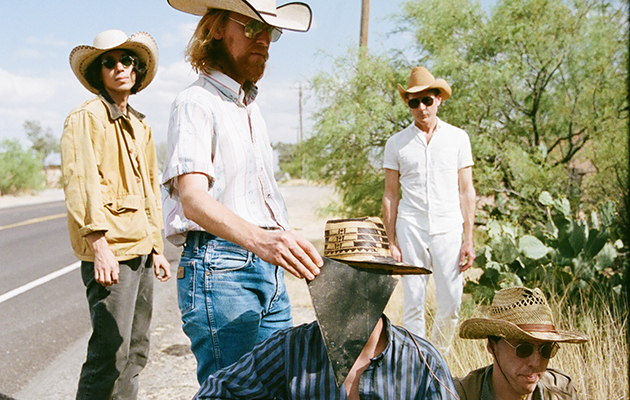Around the time of their last album, 2015’s Fading Frontier, something about Deerhunter changed. It might have had to do with the serious accident the band’s enigmatic frontman and chief songwriter Bradford Cox suffered in the summer of 2014 – he was hit by a car – which left him feeling emotionally numb following the recuperative course of painkillers he was prescribed. You could reason, too, that after a decade of wilfully experimental and wildly indulgent art rock, which resulted in a couple of this decade’s outsider masterpieces in Halcyon Digest and Monomania, the group naturally mellowed and chose to focus their considerable abilities.
Either way, Fading Frontier found them taking stock of their anxieties and reining in their flights of fantasy to compose a very human and heartfelt record, proving, not that it were needed, that Cox could engage in a kind of direct, emotional pop. At the time, he likened Fading Frontier to the first day of spring after a brutal winter. Were we to extend that analogy, its follow-up Why Hasn’t Everything Already Disappeared? might be a glorious day in late summer, but on closer inspection things are slightly off: the fruit hanging from the trees is rotten and shrivelled, the animals are lame, and the water in the streams tastes bitter, metallic. The earth is toxic.
Order the latest issue of Uncut online and have it sent to your home!
Part eco-lament, part eulogy for emotion, part reflection on the 24-hour news cycle in the age of Trump and the threat of nationalism, on WHEAD? Cox delivers a fairly stark status update for humanity – “Walk around and you’ll see what’s fading”, he warns on “Death In Midsummer” – but sugars the pill by wrapping the message in some of Deerhunter’s prettiest songs to date; the dopamine hits we crave while scrolling through our feeds. Baroque harpsichord and mandolin melodies are sprinkled liberally across “Death In Midsummer”, “What Happens To People” and “Element”, which clip along jauntily as if the band were parading down Carnaby Street on a sunny Sunday afternoon. Tucked near the end of the album, the effortless “Plains”, where Cox muses on the actor James Dean’s time in Marfa, Texas, could become the radio hit they’ve so far managed to avoid.
Cox says he has never worked so hard on an album, the fully formed demos he made in the attic studio of his Atlanta home brought to various studios to record with the band and regular producer Ben Allen. What’s new about this record is the involvement of Welsh musician Cate Le Bon, known for her freewheeling lo-fi solo work and as part of Drinks. Cox recruited her as producer after the pair worked together during last year’s Marfa Myths series in the artist outpost of Marfa, where they returned to finish this album. He struggles to pin down her precise qualities, implying that her mere presence in the studio is inspiration enough, but there’s a freshness and looseness to the material not heard before. Her layered vocals on the celestial “Tarnung”, a Visible Cloaks-style marimba shimmer written by Lockett Pundt, provide a moment of tranquillity.
Like Sonic Youth before them, what makes Deerhunter one of today’s great American bands is their ability to absorb their environment and channel this into music that always strives to be different to what they’ve done before and which challenges preconceptions of who they are. In acknowledging that “No One’s Sleeping” is a response to the senseless murder of Labour MP Jo Cox in June 2016, her namesake, the archetypal wildcard dreamer, reveals that in fact he’s very much engaged with reality, though he keeps politics out of this Lodger-period Bowie number, preferring his usual allegory: “In the country there’s much duress. Violence has taken hold. Follow me, the golden void.”
Not everything is a success: on an album that explores relatively formal and concise songwriting, the more abstract pieces fall flat, such as the Numan-ish synth exercise “Greenpoint Gothic’ or “Détournement”’s cybernetic drift. In staking out an oddly agreeable middle-ground for Deerhunter, Cox risks forfeiting that element of danger and weirdness that made his band so special. Having restrained himself in that regard, his questing spirit is manifested in other ways, not least, on this album, in his cautious sense of responsibility and his despair for the planet and society. “Your cage is what you make it”, he sings on “Futurism”. “If you decorate it, it goes by faster.” At the age of 36, Cox is facing the future, and he’s not sure whether to laugh or cry.


